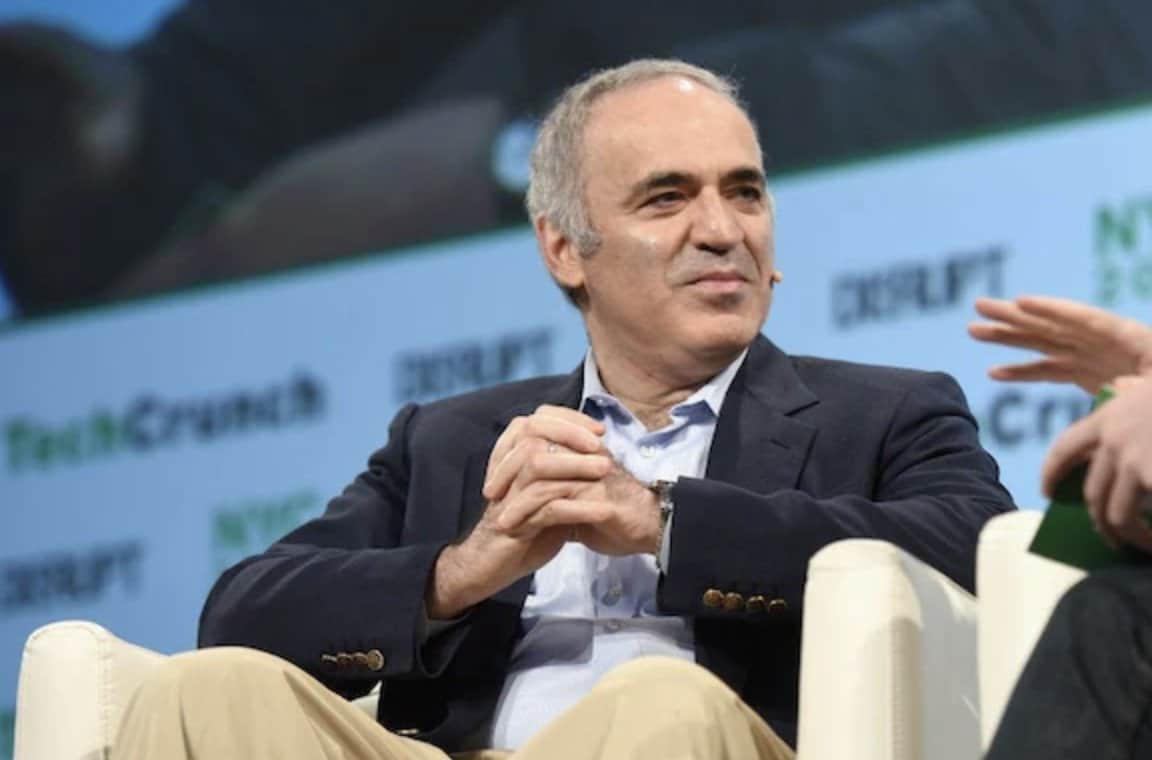He’s one of the most intelligent people alive and widely recognized as the best chess player ever. Garry Kasparov is also a big cryptocurrency enthusiast, and he thinks Bitcoin is going to replace the US dollar as the world’s dominant currency pretty soon.
The former world number 1, who occupied the top spot for over 20 years, hasn’t played chess professionally in some time, but he still keeps his mind razor-sharp by working on several projects. Crypto is one of them, and in a recent interview with CoinDesk, the famous chess master states why he believes Bitcoin won’t fail in its quest to become the dominant global currecy.
Kasparov’s thinking
Growing up in Soviet-era Russia, Garry Kasparov saw first-hand how reckless government spending can wreck economies. It’s something that he still rallies against today: in the interview, he calls out modern governments who print out ‘unlimited’ amounts of money, which to him is just a way of borrowing from their citizens and future generations.
Cryptocurrencies change this, he says: they give the power back to the people. They protect us from government money printing, and the devaluation of money, through simple math. Bitcoin, for example, is a finite resource. There are only 21 million coins in existence, and the authorities can’t magic more out of thin air.
In a digital world where the virtual coins are intertwined with our technological progress, they allow people greater financial autonomy. And this, according to Kasparov, is essential for the world’s future.

Crypto’s success
Kasparov’s theory is backed up by Bitcoin’s – and crypto’s – meteoric rise. During the pandemic alone, Bitcoin’s value has risen by over 80% to highs of around $60,000. While that has since dropped, it’s still part of a decade-long trajectory that means that investors who bought, say, 100 BTC for around $500 a decade ago are now sitting on a fortune that good lottery jackpot anywhere in the world.
However, the crypto trading prices only make up a small part of it. Bitcoin (and several Altcoins) are now accepted payment methods for thousands of online businesses, users can exchange Bitcoin for cash at special Bitcoin ATMs, while several countries are even thinking of adopting it as an official currency – El Salvador became the first to do so late last year.
There are also several related industries that have appeared in the wake of the crypto boom. Non-fungible tokens (NFTs) run on smart contracts powered by the same blockchain that powers major crypto coin Ethereum (ETH). Kasparov sees the merit in this industry too: last year he released a series of 32 tokens that showcase the most important moments of his life, from his famous ‘man vs machine’ chess battle against IBM’s ‘Deep Blue’ machine to his major political speeches.
In short, the future looks bright for all things digital, according to the chess master. Traditional, or fiat, currencies, on the other hand, are heading in the opposite direction, thanks to an inflexible financial system.
The ultimate tool
Garry Kasparov doesn’t just believe in crypto’s practical uses; he sees it as a vital weapon against totalitarianism in the future. Already an outspoken opponent of several autocratic political leaders, he started to work with the Human Rights Foundation to offer support to other dissidents around the world.
It was this involvement that led Kasparov to crypto, as members of the foundation used it to gain funding that they would otherwise find impossible to get via existing channels. The more he learned about crypto, and the blockchain behind it, the more interested he became. He concluded that supporting crypto would be an ‘important part’ in his ‘contribution to the future of humanity’.
That’s not to say that he believes virtual currencies are a miracle solution. If misused, it can benefit some bad people, he says, but the key is balance. To harness its power, to use it as a tool, to make trade-offs, is essential if it’s going to be successful — and it’s the responsibility of people like him to make that happen.
A decade from now
So, what next for Bitcoin? Is it in a position to take dollar’s place within the next few years, or will it be a slower process?
Note down the year 2032 in your diary. By then, Kasparov says he ‘wouldn’t be surprised’ is replaced by Bitcoin, or even a ‘basket of crypto coins’, as the global standard. Judging by the Russian legend’s almost supernatural prediction powers while playing chess, it would take a brave person to bet against him.
 en.cryptonomist.ch
en.cryptonomist.ch